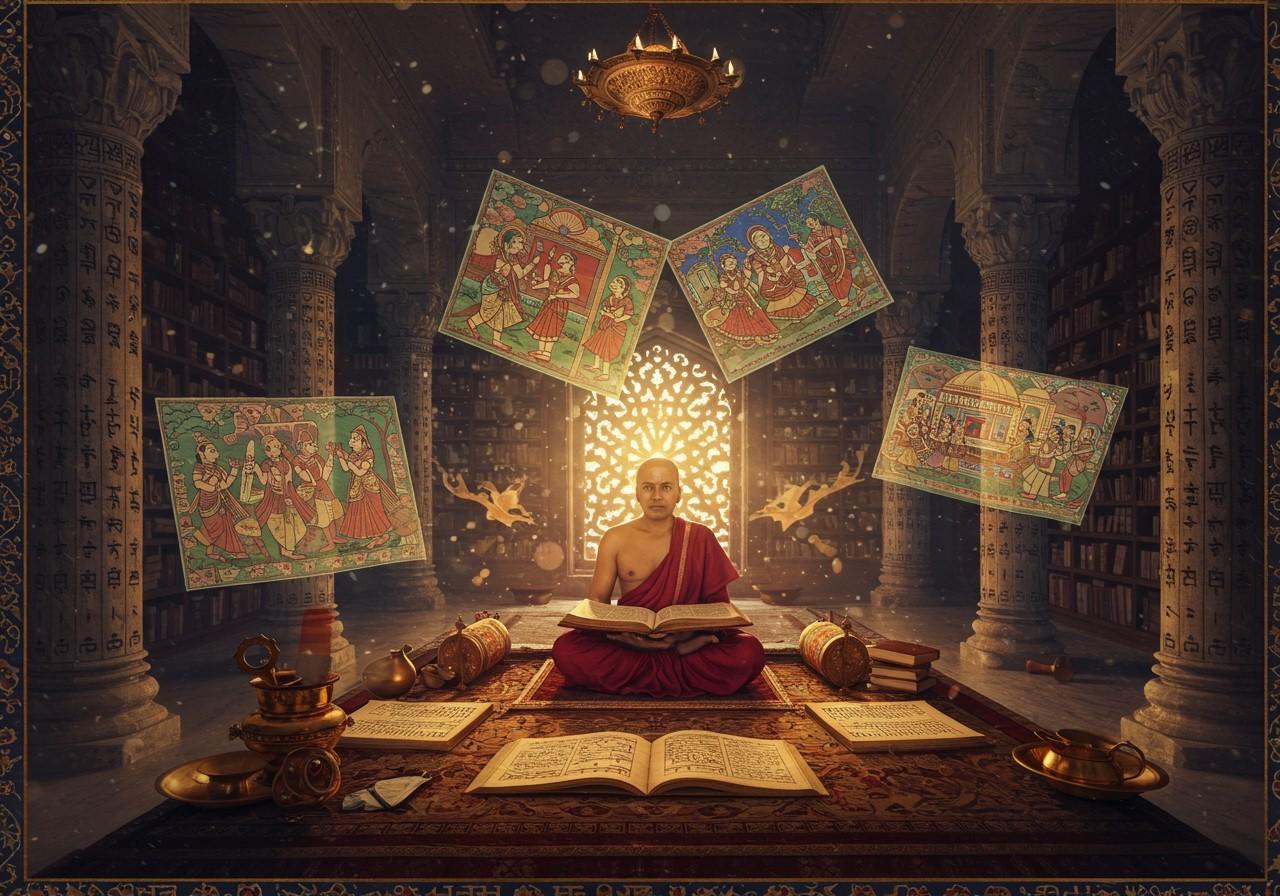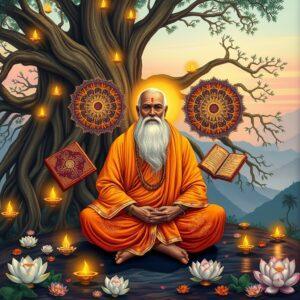
Medieval Indian literature, a treasure of wisdom and cultural reflection, boasts the Varna Ratnakara for its unique prose and poetry blend. Penned by Jyotirishvara Thakur, this text offers a glimpse into the social and cultural dynamics of medieval India, inspiring those who cherish authenticity and tradition.
Understanding Varna Ratnakara
Historical Context and Literary Structure
Composed during the culturally rich and innovative medieval period of Indian history (7th-18th century), Varna Ratnakara showcases a captivating mix of prose and poetry. Its versification and narrative techniques, reflecting social hierarchy and cultural diversity, offer valuable insights into societal norms of that era.
Linguistic Style and Everyday Life
The Sanskrit-infused linguistic style of Varna Ratnakara empowers its expressive depth. Vivid descriptions of everyday life and societal norms connect readers to the past. Its influence on later literary works solidifies its place in Indian literature’s legacy.
Enduring Influence
Varna Ratnakara‘s impact transcends its historical context, influencing modern literature and cultural discourse. Its themes of social hierarchy and cultural identity continue to resonate. As a foundational text, it remains crucial for understanding and appreciating India’s rich literary heritage.
Medieval Indian literature, rich with influential voices, is categorized into Early Medieval (7th-14th century) and Late Medieval (14th-18th century) periods, marking an era of creativity and spiritual exploration.
Early Medieval period witnessed figures like Kabir and Guru Nanak, whose spiritual writings resonated deeply with the masses, emphasizing devotion and introspection. Tulsidas, another iconic writer, composed works still revered in religious and cultural settings.
This era’s literature often celebrated regional beliefs. The Charyapadas, Buddhist mystic songs in Bengali, offer insights into spiritual practices. The 12th-century Tantric verses explore esoteric themes that continue to intrigue scholars.
Flourishing with diverse themes and forms, Late Medieval literature significantly contributed to India’s cultural and religious fabric, mirroring societal values and beliefs.
Exploring medieval Indian literature provides a window into the past, revealing how these timeless works shaped India’s identity and traditions, demonstrating storytelling’s power in preserving cultural heritage. Through these writings, we appreciate the depth and diversity of India’s literary legacy.
Essential Ritual Items from Poojn for Vedic Studies
Poojn.in offers authentic products for studying ancient Vedic texts like Varna Ratnakara:
- Copper and Brass Study Items: Traditional items like book stands (pathshala) and pooja bells create an ideal learning atmosphere. These items, crafted with care, enhance the traditional study experience. Shop Copper Items
- Pure Cotton Vastras: White cotton vastras and angavastrams are essential for text recitation and study. Available in various sizes for scholars’ comfort. Shop Vastras
- Ritual Accessories: Kumkum, chandanam, and akshata are vital for text ceremonies and study rituals. These items ensure authenticity in your practices. Shop Accessories
- Meditation Supplies: Copper water vessels, meditation mats, etc., support focused study. Enhance your concentration and create a peaceful study environment. Shop Meditation Items
Poojn.in ensures quality-checked products from authentic sources, with pan-India delivery and secure packaging. Our customer service guides you in selecting items for your textual study needs. Browse Complete Collection
Reflecting on a Literary Legacy
Medieval Indian literature stands as a testament to creativity and spirituality. From Kabir’s verses to Guru Nanak’s teachings, these works connect us to a bygone era. Tulsidas and the Charyapada creators highlight the beauty of devotion and tradition. Tracing these literary journeys reveals the threads of our cultural heritage. These stories continue to inspire, reminding us of India’s rich past. Embracing this legacy honors our history and enriches our present.
FAQs on Varna Ratnakara: Exploring Medieval Indian Literature
What is Varna Ratnakara? Varna Ratnakara is a renowned medieval Indian literary work, celebrated for its rich language and cultural insights.
Who wrote Varna Ratnakara? Jyotirishvara Thakur, a celebrated medieval poet and scholar, authored Varna Ratnakara.
Why is Varna Ratnakara significant? It provides a detailed view of medieval India’s society, culture, and language.
What themes are explored? Varna Ratnakara delves into social structure, daily life, and contemporary values, reflecting medieval India’s traditions and beliefs.
How does it compare to other medieval Indian literature? Its comprehensive portrayal of contemporary life makes it unique, blending informative and artistic elements.
Where can one find Varna Ratnakara today? It’s available in libraries, museums, and online platforms specializing in ancient texts.
How did Jyotirishvara Thakur contribute to Indian literature? Through his distinctive style and insightful observations in Varna Ratnakara, he enriched Indian literature.


